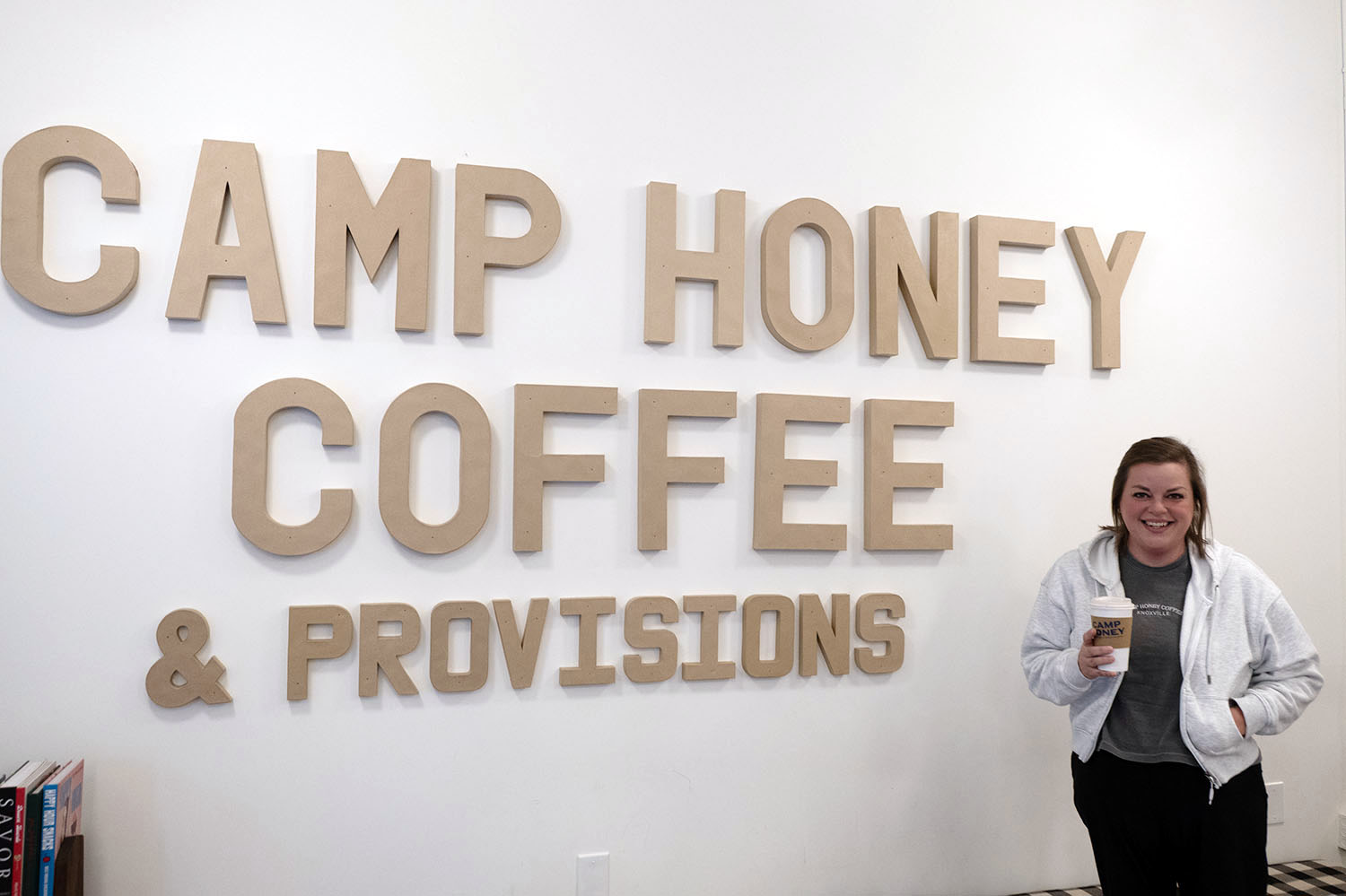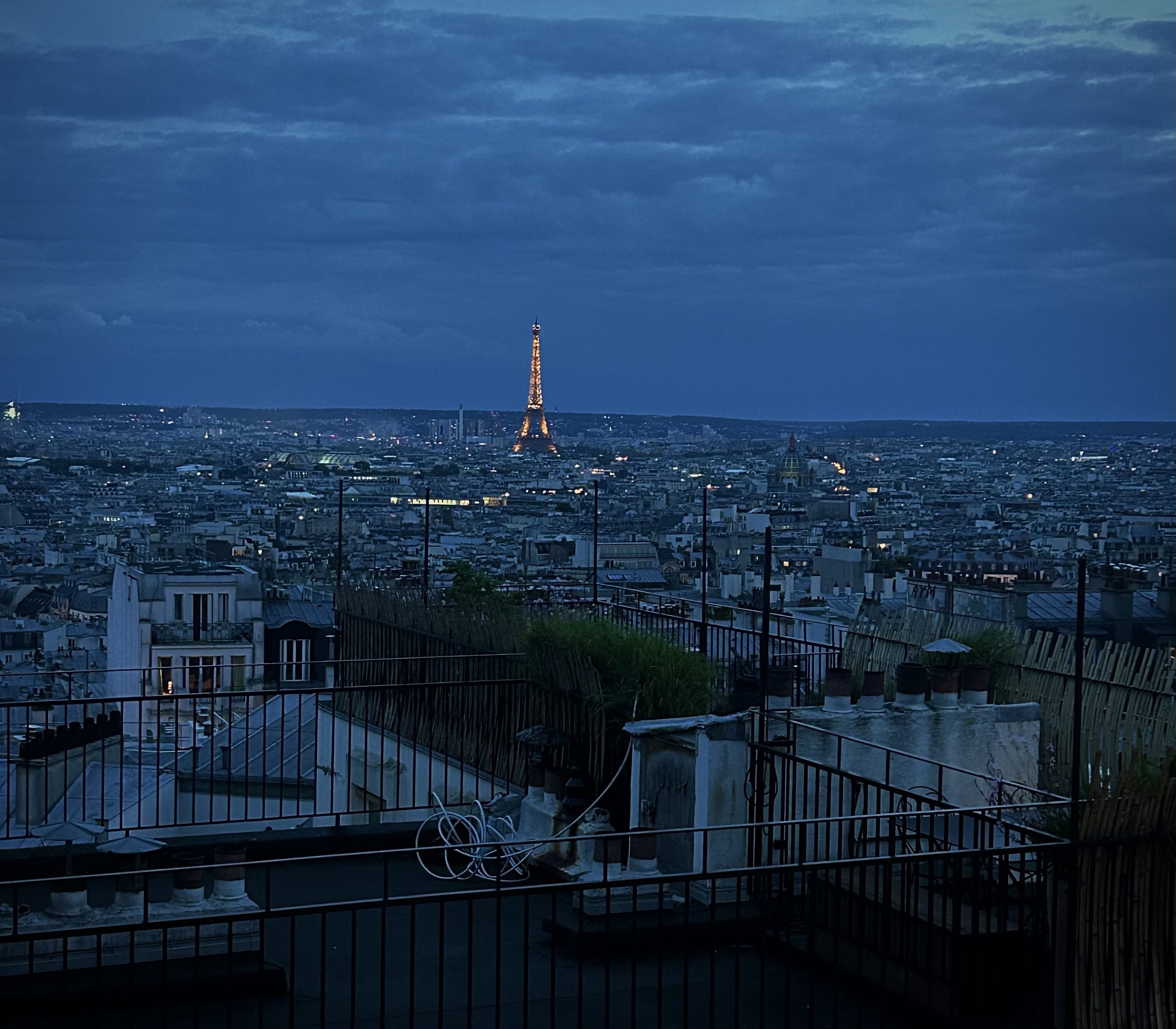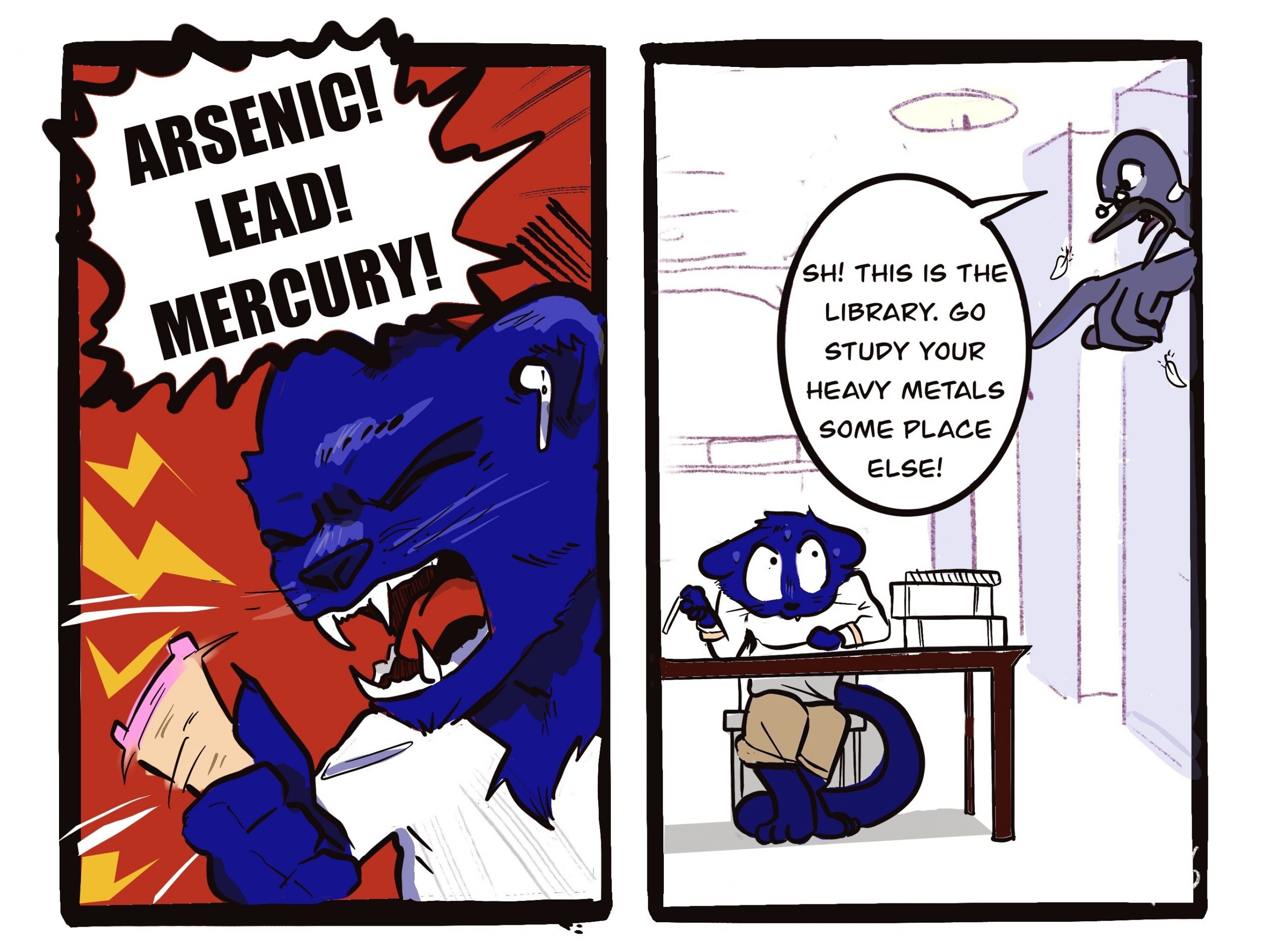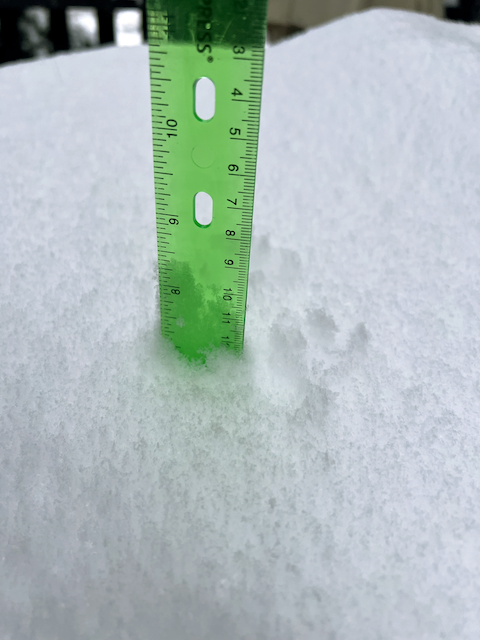By Anna Trevathan, Managing Editor
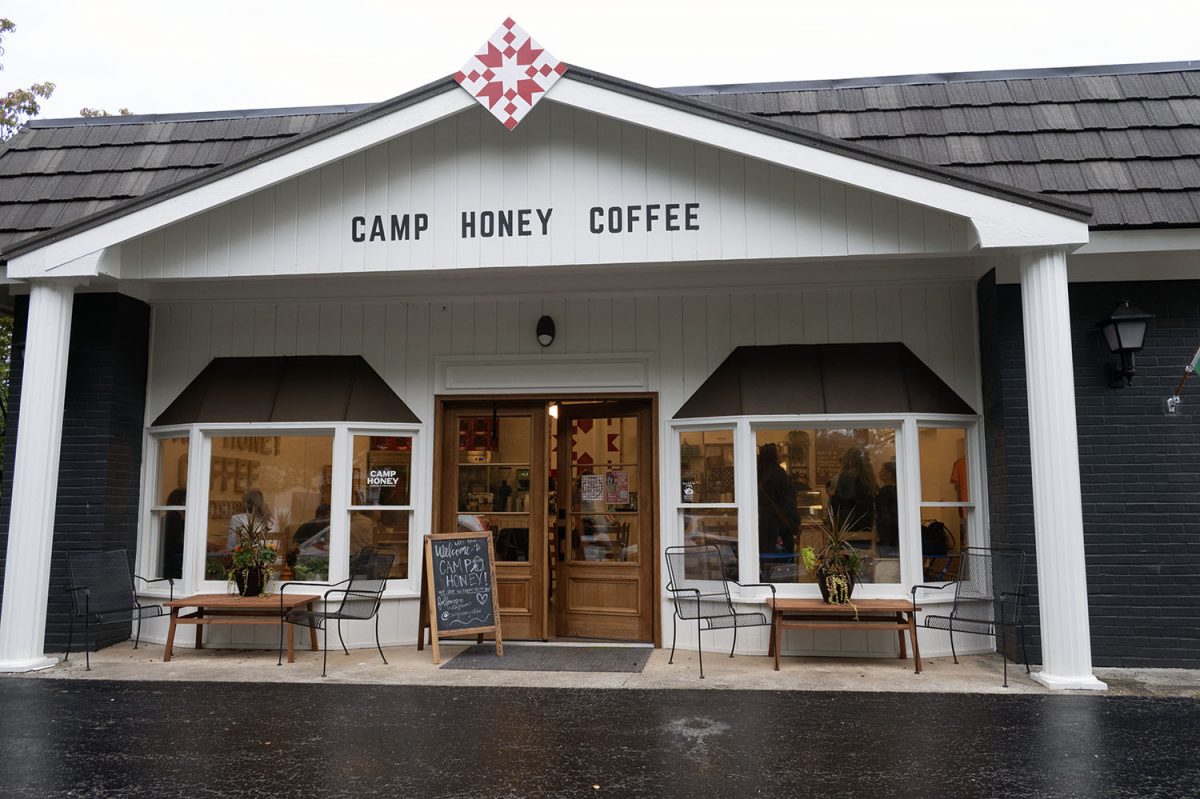
Camp Honey Coffee splashed into Knoxville this summer, and brought taste with it. There is something about this space, with its picnic benches full of people catching up in the sunshine and the physical shop showing off local makers – I could stay here forever. Not to mention the taste; espresso has never been so good. Above all of that, the individuals behind the counter make the space what it really is.
In this interview, I got to speak to one of those people: Whitney Holliday, the owner and founder of Camp Honey Coffee. When my photographer and I came in for the interview, we were greeted not only with delicious made-in-house drinks (fancy syrups and marshmallows included) but also with a genuine, delightful interview. Holiday welcomed us in the same way she welcomes customers: with warmth, laughter, and girlhood.
What follows is a story of perseverance and vision, with Pellissippi State Community College’s alum who turned coffee into community.
Anna: Would you like to introduce yourself to readers? Who are you beyond Camp Honey Coffee?
Whitney: My name’s Whitney Holiday. I’m a 37 year old mom. I was born and raised here in Knoxville, and I was actually raised here in this neighborhood. I grew up here… I drove past this building every day, going to and from high school. It’s my community, which is really special too. But as a person, I’m a mom, I’m a wife. I’m married to my high school sweetheart, Ryan. We’ve been together since high school. He went to Bearden and I went to West [High School.] We both went to Pellissippi [State] too, so. We both went there for two years before we went to Maryville College and I went to UTK. I majored in hotel restaurant and tourism- hospitality management, basically. I had no idea when I wanted to do it.
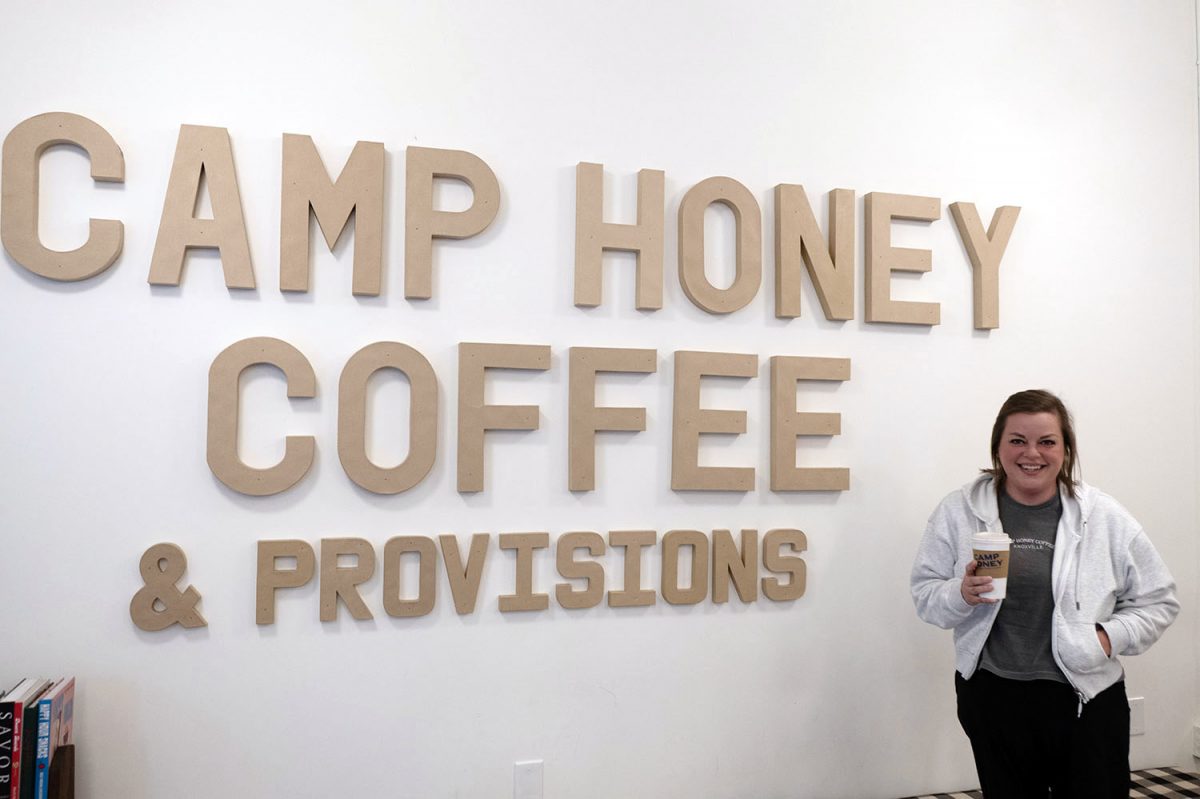
I worked at several hotels in the area and then I worked for a corporate job as a territory revenue manager. It was a remote job, before remote jobs were a thing. It was amazing, and I really loved that, and did that until COVID. Then, in COVID, hospitality took a bit of a hit, so I had to decide what I wanted to do. I went into a nonprofit after that, and worked in advocacy for kids and it was really special. I would go to D.C and Nashville and meet with the legislators to try to convince them to vote on certain policies that affected kids. It was a really special job too, but it led to craziness. I decided that I wanted to work for myself.
I’ve always talked about owning a cafe: my husband and I love coffee. We’ve always kind of talked about something like that and never quite wanted to commit to it, if that makes sense. The actual commitment was a huge turning point for me, too, like deciding to literally put a mortgage on my house to pay for the business– it was a lot. It was a big commitment, but look, I’m so glad I did it.
And that’s how it got here. I’m truly thrilled to see what will happen next. I don’t necessarily want to open a second location. The location was always the location. I wanted it to be right next to the park. I wanted it to be a standalone building that had parking. I wanted it to have a side yard over here. We’re building picnic tables over the next few weeks, too. I want to be able to sit outside. I love the tree coverage and stuff over here. We’re gonna build a nice little side yard area to make it a little more outdoor friendly, too. I really envisioned all of this to be in this space and to have the retail side as well.
I’ve never really seen anything like that locally, but I’ve seen it in other cities, you know, where they would have some really cool things. Mostly, it’s a small batch: a lot of female makers and things like that. That’s kind of my motivation in all of the community stuff and in the retail side is to try and give back to some other small businesses, get them shelf space where they may never have had it.
A: So, what inspired you to create camp honey? What’s behind the name?
W: It started as a beekeeping operation during COVID. My husband and I bought 100,000 bees and put them on my parents’ property, and we called it Camp Honey. They had like 20 acres that backed up to the National Forest. You know, it’s huge. It was like a nice, idealistic place to do that. They all left – the bees, they absconded. They decided that they wanted to go somewhere else. So we were like, well, that was a huge waste of time and money. I didn’t even know that was an option. They’re wild animals. So it’s like, I mean, again, we could not have put them in a better place. They usually do that (abscond); if you don’t put them in an environment where they’ll thrive, they leave.
That’s kind of a metaphor for all of this, if that makes sense. We did not put them in an environment where they thrived, so they decided to go thrive somewhere else, and that is kind of the model that I do with this. Everybody has a choice, especially my staff. I’m not very particular with them. I never want to work so hard that I’m not happy. Not for a single day of my life, not for a minute of my life, frankly. And I express that to them. Like, if you are not happy here, you tell me why, we will try and fix it and if you’re still not, let’s try and find yourself [something] better, something different. It may just not be the space for you.
Beekeeping helped me realize I can’t control everything and that you shouldn’t try and control everything because even if you do, it’s just wasting your energy. Kind of letting people and bees be what they are. And then, you know, go from there. But that’s where the name came from, we called it Camp Honey and then, when we decided to do this, I thought about several different names, actually. I just circled back to that when it was something that I had created, which you going into marketing will understand, creating a unique name is incredibly difficult. Especially on, like, Instagram and things, even if you thought of a small idea that may not go very far someone may have already thought of the name and it has taken the Instagram handle and they have two followers and you can’t get it now. I had to be very thoughtful about that and making sure that I came up with a unique name that would be able to last. And so I love Camp Honey.
Now, whether what we do next is going to be called that I don’t know; we’re kind of trying to decide where we want to go next with this. Matcha is very interesting to us.. I want to be about that. Matcha is something we want to try to dive into more. We’re looking into systems to grind our own fresh here and to try and give fresh tea and all that. It is a whole thing, though, because with matcha there’s already a shortage. There are already tariffs on it. It is an imported commodity that is incredibly difficult to get and to price, hence the shortage of all of that stuff. So, we want to try to make it more local too. No one else locally makes matcha. So I was trying to think of something that we could expand into next, that no one else in the community already has.
A: The name has always felt like “Parent Trap” vibes to me, and the space seems to match that?
W: Yeah, I love that. Every time I’m in here and I’m like, oh, this is cozy… I just, I love it. And I feel like it matches. Well, I am a millennial, obviously [I] grew up on “The Parent Trap. So”, obviously, it has to shape everything that I do, with 90s rom coms and stuff too. Like, that’s what I grew up on. I’m a late 80s baby. So I grew up in the 90s and 80s. I hope all of this speaks to that. Right now, the music we’re playing is “90s Mixtape,” that’s just what I love. I think it’s a little nostalgic and, you know, now it’s coming back around, which is interesting to me. Yeah. I love it.
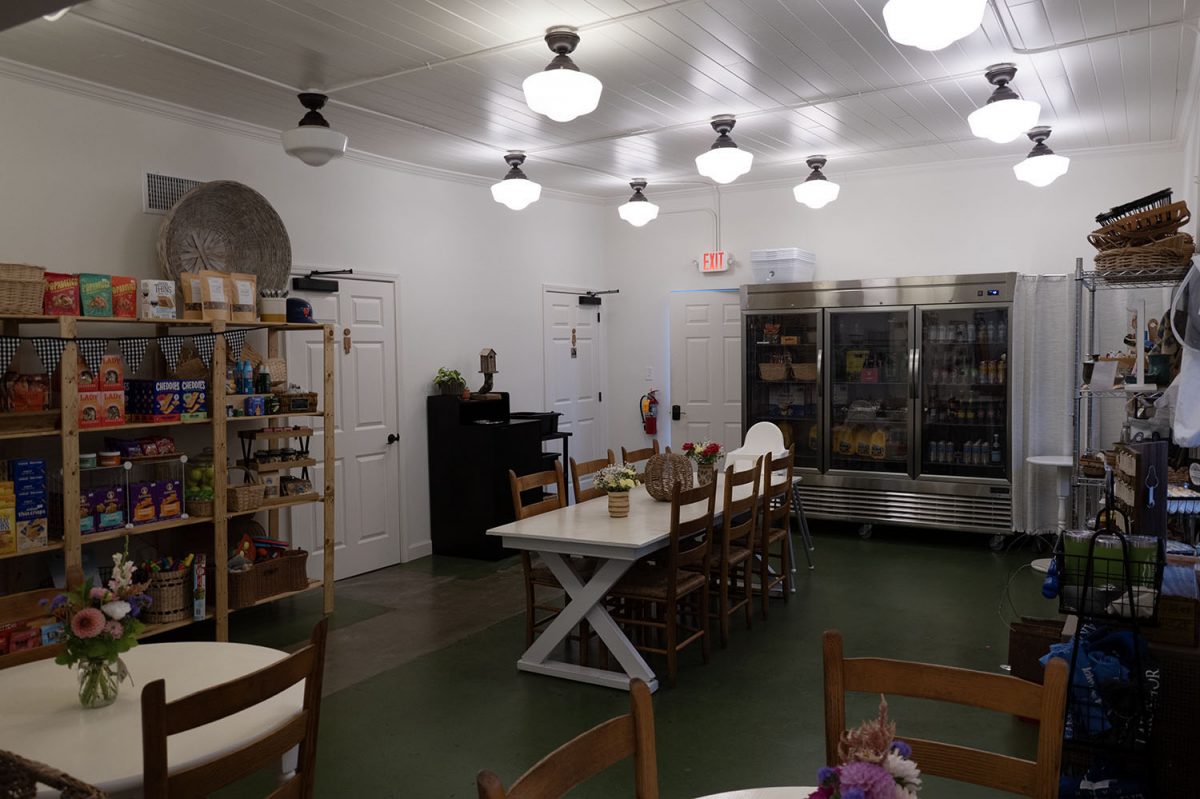
A: How would you describe “Camp Honey” if they were a person?
W: That’s a really good question. I hope it’s a she, obviously. 90% of my business is female driven and Instagram is 95%. So I really speak to women. Yeah, I’m for them, I don’t know [if] that it was my intention… well I would say it was. I mean, it was. I’m not trying to exclude the boys. Look, we’re happy when they come, but it’s a coffee shop for girls. That was the whole thing, I want to feel safe at work. I want to feel happy at work. And the girls are how I do that. Like, it really is such a nice environment to be in.
So, I hope that Camp Honey comes across as a she that is approachable, relatable, that is empathetic; like, a lot of what I speak about on social media is my mental health struggle getting here, which was crazy. I mean, that’s the only reason I did this was because I had a literal nervous breakdown and it pushed me into something so much better. I really want to help other people with that too. There’s no shame in having even the worst mental health crisis you can have; you can come out of it, you can do something with it. You can channel it into positive energy now and that’s what I want to do. I hope that the shop itself comes off as a girl, it’s somewhere that is comforting and is somewhere that you can go and be welcome. The drinks are supposed to be approachable. It’s not supposed to be [a] highbrow, you know, Ethiopian brewing spot. Listen, there is a space for everything. There’s space for all of that. That’s not my thing. I sell lattes to girls. And that’s what I am so happy to do.
We developed all of this based on our lattes. We tested the milk for a year to see what kind of milk would work best with our coffee, which would taste the creamiest in the latte. We really did work on all that, and Ryan, my husband, makes all the syrups in the house. So right now, we have 13, which is a lot for him to keep up with, but we want to make sure that every time someone asks us for something, repeatedly, we’re like, “oh, wait, maybe we should do that.” We take feedback from the girls too, and try to give you what you want back. That’s something that I try to listen to and, you know, reviews and things like that get to me, but there is something to be found in all of that too. Criticism is going to be part of this. I just have to accept it. And it’s personally hard on me, but it’s part of the game and it’ll be fine. I’ll figure out what’ll work and what doesn’t. I always want to be evolving to the customer too so the people can see that and being seasonal is interesting, too.
This is the first time we’ve introduced a menu and in the summer [when Camp Honey opened,] we kind of just went with summer themed stuff and then let it be that. There was no menu. There was nothing. So now we have, you know, a little bit more space to develop stuff like that. And that’s stuff that’s fun to be creative with too, being able to do all that stuff.
A: So you talked about the House Blend syrup and making that in house… I also saw that there was a spread that you all make in house. Of all things you’re creating and producing, what are you prioritizing to be home-made?
W: That’s a really good question. We want to make sure the syrups are always made in house, because that is what differentiates you from anyone else using the same bottle of syrup. We can all buy this crap. All of us – you can, too. We can all buy this stuff and we can do it at home. We wanted to do what no one else can do and he [Ryan] does that. He makes every single one of them, he’s never even had me make one. He’s got a little book that he keeps all the little recipes in and it’s really sweet. That would be the other avenue that we could go into, too, is bottling the syrup. We talked about that and I think that we are really prioritizing good ingredients, too. I source things the best way that I can as often as I can, and if I can’t get it locally, then I buy the best I can. I really try to emphasize community, so I buy things from Butler and Bailey up the street. I buy things from the Fresh Market. You know, like local businesses, that also need support. I know that it may not seem like it, but they do. We try to use as many local products as possible.
My meat all comes from Jesse’s Butchers from up the street. He also orders certain things that are international that I just can’t get. He has suppliers, so he helps me and he wants nothing from that. We just do this for each other. I buy his stuff, he sources it for me. He even stores my meat for me because I don’t have anywhere to put it. Slices it fresh for me. Like, it’s really a wonderful relationship with my neighbors. And he sells some similar stuff that I do, so [he] could be thought of as a competitor, but we never address it that way. I am very “community over competition” and that is a phrase that I’ve heard so many times in this. The more that you lean into that, the better it feels. The work that I do goes back to other small businesses. The work that I do goes back to other women that are scared, that are making stuff, and are not sure if anyone’s going to buy. I’m so thankful to do that.
I get so excited when someone buys one of those things over there [pointing to the market space of the shop,] and I’m like, have you had that before? I love to talk to people about that stuff, too, because hopefully, my excitement shows that it’s a genuine love for all this stuff. And it’s not cheap, I’ll be honest. Like, a lot of that stuff is pretty expensive, but it’s good. We do have really inexpensive options, too. I’m trying to be conscious of students. I am obviously in the most expensive zip code in Knoxville, and that’s reflected in everything that I do here, it’s very expensive. So my stuff is [generally] not necessarily inexpensive.
I try to keep the cost of a coffee pretty normal. Like, I tried to keep that part as approachable as possible. The food, maybe not necessarily, but it is what it is. I don’t have a kitchen, I don’t have staff to help me with that. It’s like me pretty much by myself, deciding what the food is. It’s hard. But, I’m for quality. We’re paying for quality. We’re paying for something different. Frankly, the people that are coming in here are paying for convenience; not every coffee shop offers as much food as we do, but I am personally interested in food so that kind of drives my motivation with that. To answer the question though, what I would like to lean more into is with the food, I just am not sure exactly how I’m going to do that yet. That was actually the first thing that I expanded, though – I started making chicken salad, which was such an afterthought, and like, it sounds crazy. These people are, at 10 o’clock in the morning, buying chicken salad sandwiches. I’m like, that’s wild, but I’m so glad you’re doing it. And I’ll keep making them for you. I’m so happy, obviously, when people like the things that I make.
We’ve never adjusted to prices of anything either. My motivation is to try to make it better. At my cost, I buy better ingredients to make the same products. At my cost, I do whatever it is that needs to be done to test. I make sure that the product itself is the best that it can be. I think that’s what the next step will be, a piece of advice I got from another restaurant owner was do what you do the best, then worry about switching to something different. So what I need to do right now is make the best coffee that I can make. Then we’ll switch to something else. That’s kind of what we were doing with the fall menu, [making] things that were a little more viral.
We’ve learned that too. Our matcha did not start with the puree on the side. It started with just the stuff on the bottom. It looked kind of boring, basic, whatever. Then, as soon as people started liking it, I was like, wait, I should invest a lot more of my energy into these drinks that they’re paying money for and not charge them more for it. Then we invested more into the drink itself to make it prettier. That’s what my motivation is right now, to try and just make what we already do the best I can.
A: This is such a student space. Every time I come in here, I see them studying, drinking, chatting, and eating. What do you think makes this place so special for them?
W: I think my favorite time of life was being a student. I kind of evolved the coffee shop around what I would have wanted to see at that age, too, especially being so close to campus. I know where I am, but I’m also not directly on campus. I try to have a little bit of a distinction too, so that they don’t feel like they’re still on campus when they’re here. I wanted to feel like you’re away from school [and] whatever pressure that might be providing you. So [you feel like] you’re at camp and that you can spend the day having your little treat and studying.
I also hire a lot of students because I want to be able to support them in that capacity too. I didn’t have a flexible work schedule when I was a student, and that was really hard on me. I try to give that to them. They work only when they want to. I approve the schedule by them every single week before I post it. I make sure that everyone has what they need. I know this isn’t their only thing and being in school is a lot with working. I worked every single day while I was in school. I want to make sure that I give them the support they need to finish.
It took me six years to get a four-year degree because it just did. I worked all the way through. It was really important to me. It was important to me to finish. I didn’t finish it all at one place; I went to Pellissippi [State], I went to UT, and then I graduated from a different school. That was just my journey. I think that Pellissippi [State] is such an interesting place because it gave me the space to decide what I wanted to do next. That’s always kind of [what] my thought process is, you do the thing and then you decide if that’s what you wanted. It really allowed me that space. Being a student was a hard time for me, because I worked and navigated all of that.
[We’re] providing a space for my staff and for the actual students where they feel taken care of and welcomed. We’re going to order more furniture. My husband and I literally paid for all of this ourselves. I don’t know if you know a lot about, like, corporate, non-commercial real estate. I rented the building, however, you have to pay for all of everything you do to it yourself. The guy that owns this building keeps all of this. I paid for it, and that sucks. That’s really hard. I went a little cheaper on everything in the beginning. I didn’t know if this was even going to work.
Now my point is we’re going to invest in some comfier chairs for a little bit more of an inviting study space. We already added certain things, like a ton of outlets because we didn’t have them at first. With things like that, we try to be conscious of students and make sure that they have everything that they need to set up for whatever. We’re also a social coffee shop rather than a study shop because it is so loud in here and that’s just part of it. We’re also going to invest in some noise cancellation stuff too. It’s trying to make it a little quieter because, I mean, most students study with their headphones on anyway. So I don’t think they really care that it’s that loud in here, but I’m still trying to be conscious of it.
Especially with Zooms and stuff too, like no one can do a Zoom. We can’t even talk and that’s a little difficult. Trying to make it more comfortable for them, that’ll be my next step too. Originally, I didn’t know what my customer base would be either, to be honest; I wasn’t really sure what it would be, but definitely students are obviously a big chunk of what we do. Truly, if there’s ever anything that we can add or change that would make it more, you know, conducive to studying, let me know.
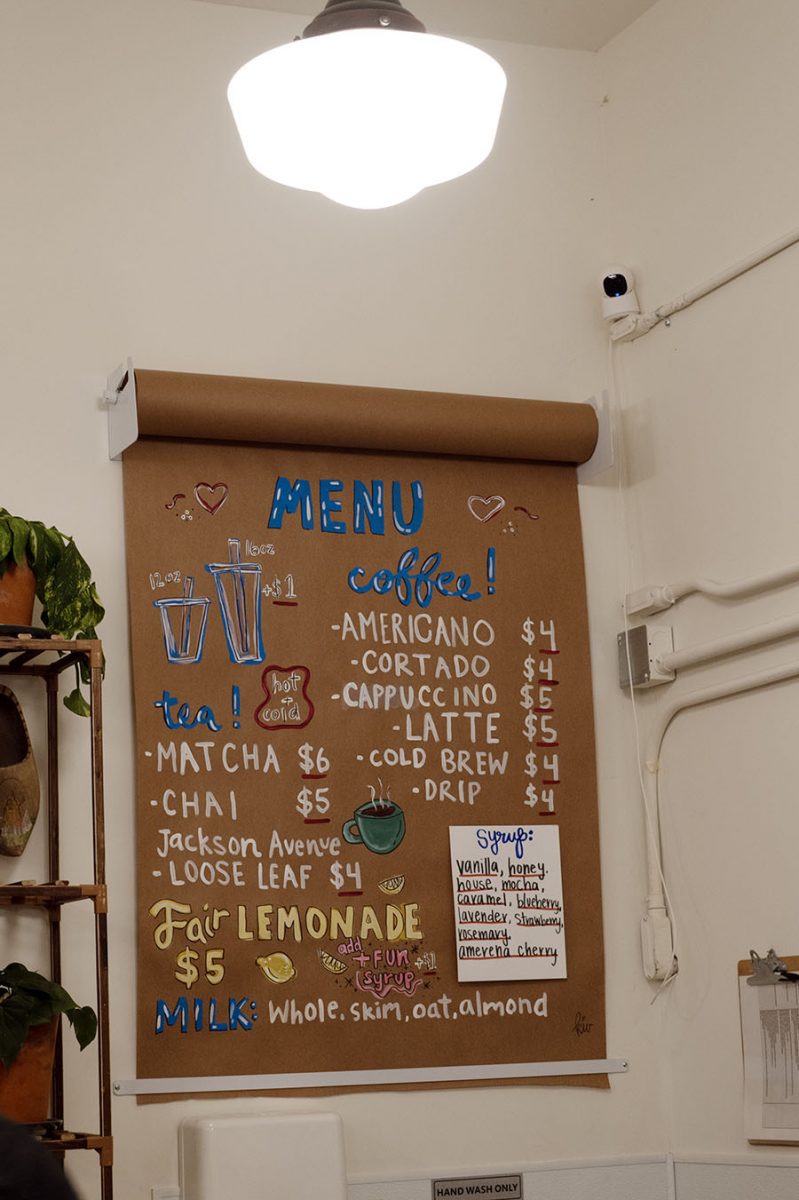
A; Since you do get a lot of students in, what drinks do you see them kind of moving towards right now?
W: Definitely the toasted marshmallow. I mean, like, the day that that came out, we were not prepared for it to be so popular. It was so funny that even in the last few days, we’ve, you know, gotten our system down and have kind of figured it out [but] we were not prepared for that.
But also, like I told you, the matcha. Matcha is a huge thing with the college girls. That’s another thing that I’m trying to utilize. It’s like, I have a perfect test market for any sort of matcha that I will ever want to make. I have thousands of people here that are willing to try it and give me feedback. That’s so helpful. I think that will help me navigate what we do next, too. That’s very important to the staff too. They try every single food item and they eat or drink whatever they want. That’s part of this. If they don’t get to try it, how do I know they can sell it? How do I know if there’s something wrong with it that I’m not sure about? We really try to test every day. Matcha, and then also just a classic vanilla latte. We sell so many vanilla lattes, but I’ve put a lot of work into it. I made sure that the vanilla latte we make is a very good one, because we sell so many of them. I don’t want to sell anything that’s not delicious, I want it to be good. So that’s the other big trending thing.
I’m interested in the fall and winter drinks. We’ve never had so many people order off of the main menu, if that makes sense. Having seasonal drinks has been so interesting. Almost everybody buys something seasonal, so that’s been interesting to watch. It’s the beginning of the season too. We opened in the summer before and college was not in, and the little kids weren’t in. We also serve a ton of moms, too. So there’s a lot of school dropoffs in this area. That’s my other big demographic and they also love matcha and vanilla lattes. It’s like I don’t have competing customers. Everybody pretty much is looking for the same thing, even though they’re wildly different demographics, it’s very interesting. So, yeah, that seems to be the trend.
A: If somebody was walking in here and had never been here, what is something that stays on the menu that you would want them to try?
W: The house syrup, which was what the entire shop was based on. It’s maple, brown sugar, honey, and cinnamon. We tested that with our specific type of coffee.That’s what we tested for a year. It’s the best. Every time that I just describe the syrup to someone, they do the same thing you did, and I love that. I mean, that’s truly what we’re the most known for and what I hope we continue to do. That’s another thing that just can’t be replicated. That will always be our house syrup. No one can do the exact same thing. I love that it is special and that people like it. It’s not like I’m forcing them, but you will like this. You will also like lavender. I tell you, that’s been so interesting too, if enough people ask me for lavender, we make lavender. Then we learn something new. It’s been really exciting, but I think that someone off the street should just order a hot or iced house latte. That’s what we do best.
A: What has been your proudest woman so far with Camp Honey Coffee?
W: Anytime that the line is out the door. It’s physical and it sounds silly, but sometimes I am so busy working in whatever that I forget to look up. Sometimes I’ll look up and the line is literally out of the door. I’m like, “are you kidding me? How? How is this happening?” I hope people know, too. Even if the line is out of the door, we try to move as quickly as possible. That is something that’s very important to me too, I don’t want you to wait. If anyone’s waiting 20 minutes for a drink, that’s too long. We really try to make sure that once you get to the register, it’s two or three minutes. That should be the wait period. Obviously, you can tell if there are lines out the door, there’s gonna be a little bit of a wait, but that just makes me so proud. I just can’t believe that, and that’s what also makes me proud is that I don’t have to force people. That’s why I wanted to be somewhere that people happen upon, too. We’re not on a back road, really. We’re on a road. We have parking. People do wander in off the street. But a lot of people find it on Instagram, too. And I’m glad for both, I’ll take both.
A: Are there any upcoming events or activities that you want our readers to know about?
W: We will be doing a lot more markets. As you mentioned, we do have a lot of the local makers over there, and they’re not selling as well as I would like. We may talk about shifting into more market style things. I already have flower trucks that come. We don’t take a dime from any of this stuff. We don’t take a dime from any of the local makers either. I just sell their stuff and I give them the cash, that’s what the deal is. And they’re so sweet. A lot of them will be like, please, would you take 20%? I’m like, no, I don’t want to, like, no. I just won’t. And that’s how we run all of that. Supporting the community is a big deal to me.
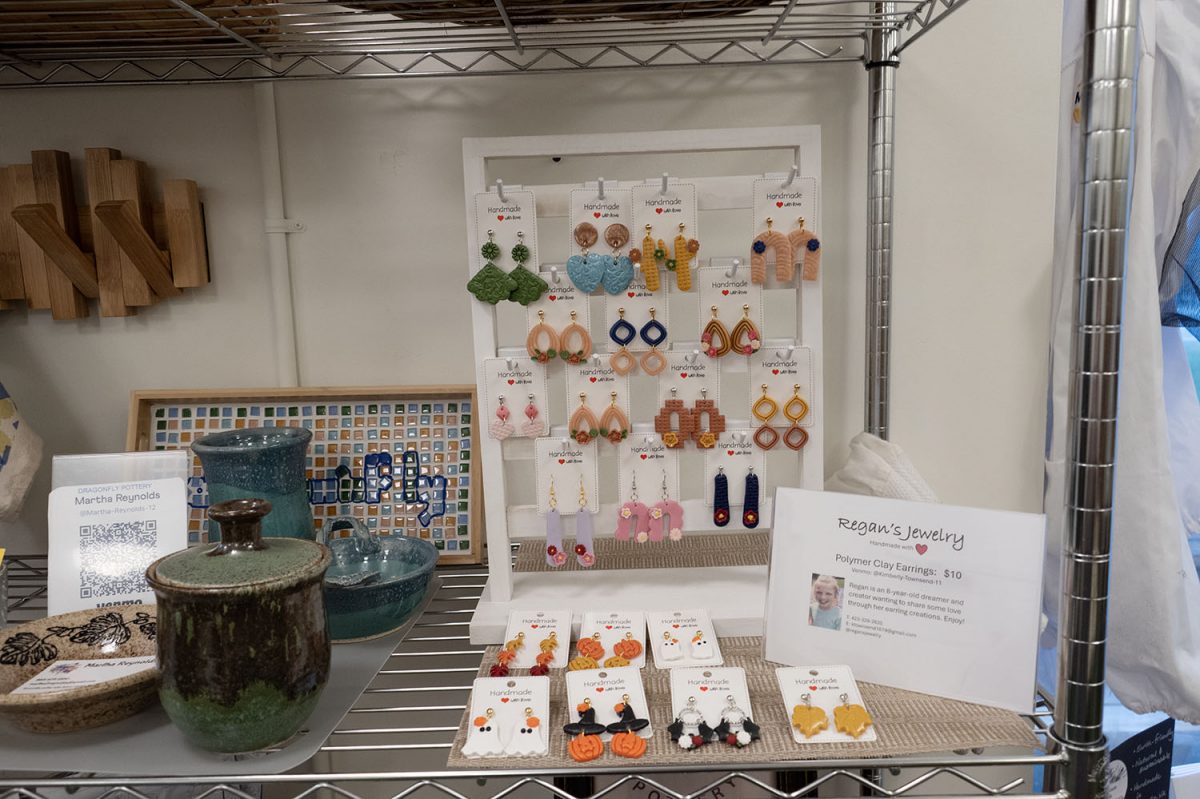
So doing some more of these events where makers themselves can meet people, I think is what makes the difference too. If you see Kendall that makes the coffee cup selling the coffee cups, you’re a little bit more likely to buy them. She can speak to it better than I can. No one will sell your stuff better than you will. It’s just the truth. So, doing a few more things like that, so we’re going to do a full market. We’ll probably do a Christmas market and things like that. Just to give a little bit more exposure to those smaller businesses. I’m letting several girls come to painting classes, too. I don’t know if you saw that, like certain people want to. Basically just have a space where they can do ticketed kind of things and I give them the space for free. I just reserve a table for them and tell them this is where the class is going to be and all that stuff. I think that offering more things like that will be a big motivator going forward to help support them any way that I can.
I want to take a moment to thank Whitney Holliday for welcoming me into this space and taking the time to discuss her journey and share the advice that has gotten her to where she is today. Her openness in this interview made me feel like I was sitting with a friend, rather than a store owner. It’s easy to see how Camp Honey Coffee has become a place where so many can feel at home, and who has been the key to all of it.

